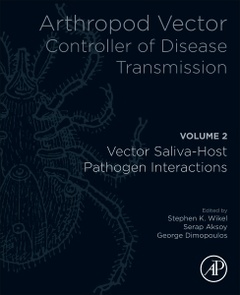Arthropod Vector: Controller of Disease Transmission, Volume 2 Vector Saliva-Host-Pathogen Interactions
Coordonnateurs : Wikel Stephen K., Aksoy Serap, Dimopoulos George

Arthropod Vector: Controller of Disease Transmission, Volume 2: Vector Saliva-Host Pathogen Interactions is built on topics initially raised at a related Keystone Symposium on Arthropod Vectors. Together with the separate, related Volume 1: Controller of Disease Transmission, this work presents a logical sequence of topic development that leads to regulatory considerations for advancing these and related concepts for developing novel control measures.
The three themes of symbionts, vector immune defenses and arthropod saliva modulation of the host environment are central to the concept of determinants of vector competence that involves all aspects of vector-borne pathogen development within the arthropod that culminates in the successful transmission to the vertebrate host.
These three areas are characterized at the present time by rapid achievement of significant, incremental insights, which advances our understanding for a wide variety of arthropod vector species, and this work is the first to extensively integrate these themes.
2. Vector Arthropods and Host Pain and Itch Responses
3. Arthropod Modulation of Wound Healing
4. Salivary Kratagonists: Scavengers of Host Physiological Effectors During Blood Feeding
5. Basic and Translational Research on Sand Fly Saliva: Pharmacology, Biomarkers, and Vaccines
6. Unique Features of Vector-Transmitted Leishmaniasis and Their Relevance to Disease Transmission and Control
7. Early Immunological Responses Upon Tsetse Fly–Mediated Trypanosome Inoculation
8. Mosquito Modulation of Arbovirus–Host Interactions
9. Tick Saliva: A Modulator of Host Defenses
10. Tick Saliva and Microbial Effector Molecules: Two Sides of the Same Coin
11. Tsetse Fly Saliva Proteins as Biomarkers of Vector Exposure
12. Epidemiological Applications of Assessing Mosquito Exposure in a Malaria-Endemic Area
13. Ixodes Tick Saliva: A Potent Controller at the Skin Interface of Early Borrelia burgdorferi Sensu Lato Transmission
14. Translation of Saliva Proteins Into Tools to Prevent Vector-Borne Disease Transmission
15. Considerations for the Translation of Vector Biology Research
Dr. Aksoy is in her fourth decade of a highly recognized career in academic research and teaching, and a recipient of many awards and honors such as Nominated Fellow, Entomological Society of America, and winner of the Connecticut Technology Council Research, Innovation and Leadership award, both in 2015. She has taught in the areas of Molecular Entomology, Vector Biology, and Biology of Eukaryotic Parasites and Helminths, with a special research focus on biology of the tsetse fly and transmission and control of trypanosomiasis. Together with Dr. Wikel she was one of three scientific organizers of the Keystone Symposium on “The Arthropod Vector: The Controller of Transmission. She is also an Editorial Board Member for the Elsevier journal Insect Biochemistry and Molecular Biology.
In addition to his academic appointments, Dr. Dimopoulos is Director of the Johns Hopkins Malaria Research Institute Parasitology Core Facility. He is a permanent memb
- Provides overviews of host defenses encountered by the blood feeding arthropod vector at the cutaneous interface
- Addresses how these defenses are modulated by the vector, specific functions of vector saliva components, host response to vector-borne infectious agents and how vector-borne pathogens themselves modulate host defenses
- Features expertly curated topics to ensure appropriate scope of coverage and aid integration of concepts and content across chapters
Date de parution : 04-2017
Ouvrage de 332 p.
19x23.3 cm
Thèmes d’Arthropod Vector: Controller of Disease Transmission... :
Mots-clés :
Acquired resistance; African trypanosomiasis; Anopheles; Antibody response; Antibody; Anticoagulants; Antigens; Antiinflammatory; Arbovirus; Arthropod vector; Arthropod; Arthropod-mediated wound modulation; Biomarker; Biomarkers; Bite exposure; Bites; Blood meal; Borrelia sp.Ixodes; CAP domain; Collagen; Control; Decision-making; Definitions; Dendritic cells; Eicosanoid; Evolution; Exposure; Extracellular matrix deposition; Fibrinogen; Glossina; Hematophagy; Hemostasis; Heparin; Histamine; Host immune responses; Immune cells; Immune modulation; Immune response; Immune system; Immune-modulators; Immunity; Immunomodulation; Infectious agent transmission; Inflammasome; Inhibitors of itch; Innate immune signaling; Inoculum; Itch; Leishmania; Lipocalin; Macrophages; Malaria; Markers of vector exposure; Mosquito; Nod-like receptors (NLRs)Pathogen effectors; Odorant-binding protein; Pain and itch pathways; Pharmacology; Product development plan (PDP)Partnership; Product development; Saliva proteins; Saliva; Saliva-assisted pathogen transmission; Salivary proteins; Salivary vaccine; Sand fly; Serotonin; Skin immune system; Skin immunity; Skin; Tick saliva; Tick-host-pathogen; Tissue remodeling; Translational path; Transmission; Trypanosoma; Trypanosomiasis; Tsetse fly; Vaccine; Vaccines; Vasodilators; Vector arthropod saliva; Vector arthropods; Vector saliva; Vector; Vector-borne diseases; Vectorborne pathogen; Vector-transmission; Vertebrate host hemostasis; Vertebrate host; Wound healing; Yellow protein



